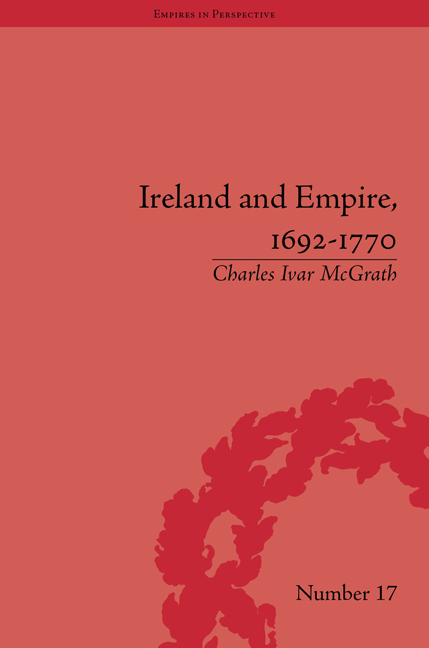3 - Politics
from Part 1 - Contexts
Summary
Political activity in early modern Ireland was more often than not centred on the question of the constitutional relationship with England and, after 1707, Britain. That constitutional status in the period 1692–1770 is also central to understanding Ireland's place and role within the empire. This chapter aims to address the question by examining political ideology and activity in Ireland, England and Britain in relation to issues of government, parliament, authority and power in the early modern period.
Kingdom or Colony?
There are a number of fundamental considerations which help to address the vexed question of whether Ireland was a separate though dependant sister kingdom or more simply a province or colony of England and Britain. On the one hand, the plantations of the sixteenth and seventeenth centuries, the influx of new settlers from England and Scotland, the wars of conquest and re conquest in 1594–1603, 1641–53 and 1689–91, and the imposition of the penal laws against Catholics in the eighteenth century all bore the hallmarks of a colonizing endeavour. On the other hand, the institutions of state, the complex ethnic and religious mixed identities, the official status as a separate kingdom and the political ideology and practice suggested a different status.
Stephen Conway has described the mid-eighteenth-century Irish parliament as ‘a local institution, with severely limited powers, rather than part of the machinery of the British state’. That rather damning assessment is based upon considerations such as the fact that it ‘met only for a few months every two years. In theory, at least, it could not even begin to debate proposed legislation until the subject had been sanctioned in London’. The device of heads of bills is acknowledged as a means of initiating legislation, but it is emphasized that even still such legislation ‘remained subject to interference and ultimate approval from London’. Likewise, from 1720 the British parliament ‘claimed the right to legislate for Ireland whenever it chose to do so’.
- Type
- Chapter
- Information
- Ireland and Empire, 1692–1770 , pp. 37 - 68Publisher: Pickering & ChattoFirst published in: 2014



